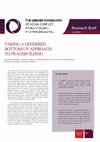Papers by Elisabeth Prügl
Feminist Strategies in International Governance, 2013
The Politics of Feminist Knowledge Transfer, 2016
Feminism means engaging with power. Feminists have rallied against patriarchal power in order to ... more Feminism means engaging with power. Feminists have rallied against patriarchal power in order to undermine it, but they also have come together to empower themselves and challenge existing arrangements. Indeed, like all human agents, women have wielded power in various feminized roles throughout history. What is new in the contemporary era is the fact that there is not just women’s power, but feminist power. That is, power that has been generated from, and is wielded through, feminist activism.
Gender Equality and Responsible Business: Expanding CSR Horizons
Gender and Politics, 2012
Diversity in the European Union, 2009
CHAPTER 14 Theorizing Diversity in the European Union Markus Thiel and Elisabeth Prugl Classical ... more CHAPTER 14 Theorizing Diversity in the European Union Markus Thiel and Elisabeth Prugl Classical European integration theories provide us with limited knowledge about the interaction of diverse minority groups with and within the European Union (EU), as they tend to be ...
NORA - Nordic Journal of Feminist and Gender Research, 2015
Perspectives on Politics, 2014
Labor Studies Journal, 1998
International Feminist Journal of Politics, 2013
American Political Science Review, 1995

Politics Trove, 2017
This chapter examines gender approaches to the study of European integration and their ontologica... more This chapter examines gender approaches to the study of European integration and their ontological claim that gender matters when probing the process of European integration. European integration is part of a sociopolitical world that is fundamentally structured by understandings of femininity and masculinity and contributes to reconstructing these understandings. Proponents of gender approaches argue that one can only fully understand and explain large parts of the European integration process with the help of a gender-sensitive perspective. The chapter first considers feminist explanations of gender equality policies at the European Union level before illustrating the contribution that gender and feminist analysis can make by presenting empirical case studies on trafficking in women and the Common Agricultural Policy (CAP). It also discusses EU enlargement from the perspective of gender politics, emphasizing the EU’s validation of hegemonic masculinity in the process of enlargement.
... considerations of gender into all policy areas, became the favored vehicle for governments ..... more ... considerations of gender into all policy areas, became the favored vehicle for governments ... Feminism and the Postmodern State: Gender Mainstreaming in European Rural Development, Signs: Journal ... of people in the countryside, it xed prices in agri-cultural commodities to ...
At the World Bank, a significant increase in commitment to gender equality came with its 2007-10 ... more At the World Bank, a significant increase in commitment to gender equality came with its 2007-10 Gender Action Plan that centred on the slogan “gender equality as smart economics”, shifting its gender equality work from a focus on women’s ‘human capital’, i.e. education and health, to economic growth and poverty alleviation, and allocated resources to accomplish this reorientation. As a result, staff in 2013 reported that 98 per cent of project appraisals considered gender issues, translating into lending of almost $31 billion. When reorganising in 2014, the Bank declared gender as one of four ‘cross-cutting solution areas’. These are clearly reasons for feminists to take a closer look.

The United Nation’s women, peace, and security agenda has brought long-overdue attention to the i... more The United Nation’s women, peace, and security agenda has brought long-overdue attention to the importance of integrating women and gender issues into peacebuilding efforts, with Security Council Resolution 1889 of 2009 initiating a planning process to achieve this. Efforts have centred on increasing women’s participation in various aspects of peacebuilding, both in terms of numbers and in terms of achieving a substantive representation of women’s needs and interests. While sensitive to local contexts, such efforts remain decidedly top-down, seeking to transform government institutions and mostly involving international and national security actors. This stands in stark contrast to trends in the peacebuilding literature, including feminist peacebuilding literature, which increasingly has emphasised that making peace sustainable requires a bottom-up approach that includes a diverse range of people, experiences and knowledges (see Rigual 2018).
This paper set out to take a first stab at a big issue, i.e. what does it mean to speak of global... more This paper set out to take a first stab at a big issue, i.e. what does it mean to speak of globalized patriarchy. It shows that gender constructions can differ significantly in different economic sectors. Preliminary hypotheses suggest that networks and the salience of feminist movement frames are key to explaining whether women’s network are successful in changing gender orders in the direction of equality. The adoption of the equality frame is facilitated if such frames resonate with the frames of other organizations populating the policy field and if it resonates with the economic regulations of the sector. Gender orders thus emerge as perpetuated and contested through network politics and as interwoven with modes of economic regulation. As such, they are never universal, but shapes on a global landscape of culture and power.
Revue internationale de politique de développement
Revue internationale de politique de développement
Expertes en genre et connaissances féministes sur le développement, 2017











Uploads
Papers by Elisabeth Prügl